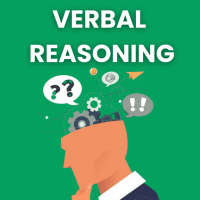UCAT Exam > UCAT Questions > If the price of the eraser is reduced by 25% ...
Start Learning for Free
If the price of the eraser is reduced by 25% a person buy 2 more erasers for a rupee. How many erasers available for a rupee?
- a)8
- b)6
- c)4
- d)2
- e)None of these
Correct answer is option 'B'. Can you explain this answer?
Verified Answer
If the price of the eraser is reduced by 25% a person buy 2 more erase...
Let n erasers be available for a rupee
Reduced Price = (75/100 Ã - 1) = Re ¾
3/4 rupee fetch n erasers = 1 Rupee will fetch (n à - 4/3) erasers
Therefore, 4n/3 = n +2 ⇒ 4n = 3n +6 ⇒ n =6
Reduced Price = (75/100 Ã - 1) = Re ¾
3/4 rupee fetch n erasers = 1 Rupee will fetch (n à - 4/3) erasers
Therefore, 4n/3 = n +2 ⇒ 4n = 3n +6 ⇒ n =6
Most Upvoted Answer
If the price of the eraser is reduced by 25% a person buy 2 more erase...
Given information:
- The price of the eraser is reduced by 25%.
- With this reduction in price, a person can buy 2 more erasers for a rupee.
To find:
- How many erasers are available for a rupee?
Assumptions:
- Let's assume that the original price of one eraser is x rupees.
Calculations:
1. Price reduction:
- The price of the eraser is reduced by 25%, which means the new price is 75% of the original price.
- The new price of one eraser is (75/100) * x = (3/4) * x rupees.
2. Number of erasers for a rupee:
- With the reduced price, a person can buy 2 more erasers for a rupee.
- This means that the person can buy (2 + 1) = 3 erasers for a rupee.
- Therefore, the new price of one eraser is (1/3) rupees.
3. Equating the two prices:
- The new price of one eraser is (3/4) * x rupees.
- The new price of one eraser is (1/3) rupees.
- Equating these two prices, we get:
(3/4) * x = (1/3)
Cross-multiplying, we get:
9x = 4
x = 4/9
Conclusion:
- The original price of one eraser is (4/9) rupees.
- Therefore, for a rupee, the number of erasers available is 1 / (4/9) = 9/4 = 2.25.
- Since we can't have a fractional number of erasers, the closest whole number is 2.
- Hence, the correct answer is option 'B': 6 erasers are available for a rupee.
- The price of the eraser is reduced by 25%.
- With this reduction in price, a person can buy 2 more erasers for a rupee.
To find:
- How many erasers are available for a rupee?
Assumptions:
- Let's assume that the original price of one eraser is x rupees.
Calculations:
1. Price reduction:
- The price of the eraser is reduced by 25%, which means the new price is 75% of the original price.
- The new price of one eraser is (75/100) * x = (3/4) * x rupees.
2. Number of erasers for a rupee:
- With the reduced price, a person can buy 2 more erasers for a rupee.
- This means that the person can buy (2 + 1) = 3 erasers for a rupee.
- Therefore, the new price of one eraser is (1/3) rupees.
3. Equating the two prices:
- The new price of one eraser is (3/4) * x rupees.
- The new price of one eraser is (1/3) rupees.
- Equating these two prices, we get:
(3/4) * x = (1/3)
Cross-multiplying, we get:
9x = 4
x = 4/9
Conclusion:
- The original price of one eraser is (4/9) rupees.
- Therefore, for a rupee, the number of erasers available is 1 / (4/9) = 9/4 = 2.25.
- Since we can't have a fractional number of erasers, the closest whole number is 2.
- Hence, the correct answer is option 'B': 6 erasers are available for a rupee.
Free Test
FREE
| Start Free Test |
Community Answer
If the price of the eraser is reduced by 25% a person buy 2 more erase...
Let n erasers be available for a rupee
Reduced Price = (75/100 Ã - 1) = Re ¾
3/4 rupee fetch n erasers = 1 Rupee will fetch (n à - 4/3) erasers
Therefore, 4n/3 = n +2 ⇒ 4n = 3n +6 ⇒ n =6
Reduced Price = (75/100 Ã - 1) = Re ¾
3/4 rupee fetch n erasers = 1 Rupee will fetch (n à - 4/3) erasers
Therefore, 4n/3 = n +2 ⇒ 4n = 3n +6 ⇒ n =6

|
Explore Courses for UCAT exam
|

|
Question Description
If the price of the eraser is reduced by 25% a person buy 2 more erasers for a rupee. How many erasers available for a rupee?a)8b)6c)4d)2e)None of theseCorrect answer is option 'B'. Can you explain this answer? for UCAT 2025 is part of UCAT preparation. The Question and answers have been prepared according to the UCAT exam syllabus. Information about If the price of the eraser is reduced by 25% a person buy 2 more erasers for a rupee. How many erasers available for a rupee?a)8b)6c)4d)2e)None of theseCorrect answer is option 'B'. Can you explain this answer? covers all topics & solutions for UCAT 2025 Exam. Find important definitions, questions, meanings, examples, exercises and tests below for If the price of the eraser is reduced by 25% a person buy 2 more erasers for a rupee. How many erasers available for a rupee?a)8b)6c)4d)2e)None of theseCorrect answer is option 'B'. Can you explain this answer?.
If the price of the eraser is reduced by 25% a person buy 2 more erasers for a rupee. How many erasers available for a rupee?a)8b)6c)4d)2e)None of theseCorrect answer is option 'B'. Can you explain this answer? for UCAT 2025 is part of UCAT preparation. The Question and answers have been prepared according to the UCAT exam syllabus. Information about If the price of the eraser is reduced by 25% a person buy 2 more erasers for a rupee. How many erasers available for a rupee?a)8b)6c)4d)2e)None of theseCorrect answer is option 'B'. Can you explain this answer? covers all topics & solutions for UCAT 2025 Exam. Find important definitions, questions, meanings, examples, exercises and tests below for If the price of the eraser is reduced by 25% a person buy 2 more erasers for a rupee. How many erasers available for a rupee?a)8b)6c)4d)2e)None of theseCorrect answer is option 'B'. Can you explain this answer?.
Solutions for If the price of the eraser is reduced by 25% a person buy 2 more erasers for a rupee. How many erasers available for a rupee?a)8b)6c)4d)2e)None of theseCorrect answer is option 'B'. Can you explain this answer? in English & in Hindi are available as part of our courses for UCAT.
Download more important topics, notes, lectures and mock test series for UCAT Exam by signing up for free.
Here you can find the meaning of If the price of the eraser is reduced by 25% a person buy 2 more erasers for a rupee. How many erasers available for a rupee?a)8b)6c)4d)2e)None of theseCorrect answer is option 'B'. Can you explain this answer? defined & explained in the simplest way possible. Besides giving the explanation of
If the price of the eraser is reduced by 25% a person buy 2 more erasers for a rupee. How many erasers available for a rupee?a)8b)6c)4d)2e)None of theseCorrect answer is option 'B'. Can you explain this answer?, a detailed solution for If the price of the eraser is reduced by 25% a person buy 2 more erasers for a rupee. How many erasers available for a rupee?a)8b)6c)4d)2e)None of theseCorrect answer is option 'B'. Can you explain this answer? has been provided alongside types of If the price of the eraser is reduced by 25% a person buy 2 more erasers for a rupee. How many erasers available for a rupee?a)8b)6c)4d)2e)None of theseCorrect answer is option 'B'. Can you explain this answer? theory, EduRev gives you an
ample number of questions to practice If the price of the eraser is reduced by 25% a person buy 2 more erasers for a rupee. How many erasers available for a rupee?a)8b)6c)4d)2e)None of theseCorrect answer is option 'B'. Can you explain this answer? tests, examples and also practice UCAT tests.

|
Explore Courses for UCAT exam
|

|
Signup for Free!
Signup to see your scores go up within 7 days! Learn & Practice with 1000+ FREE Notes, Videos & Tests.


















